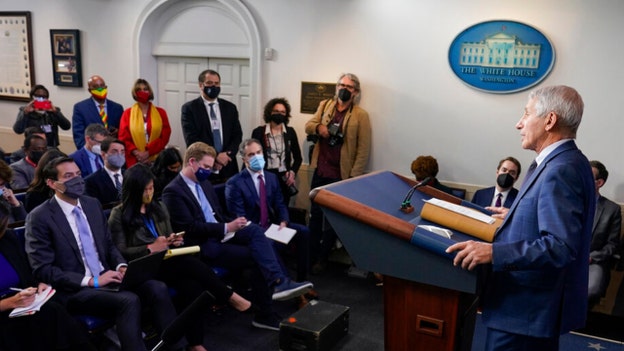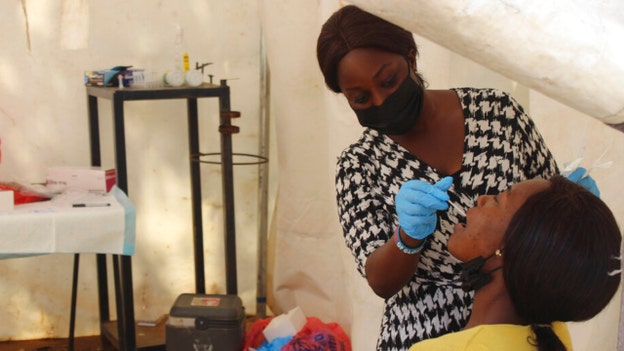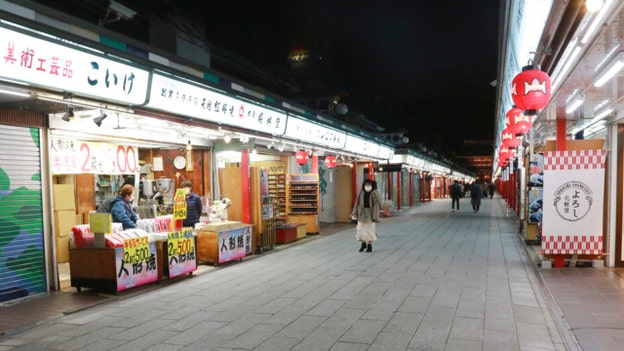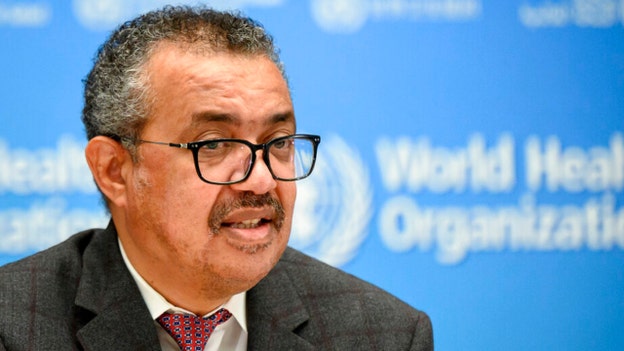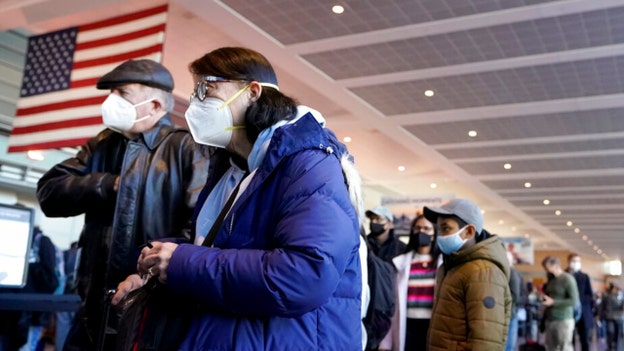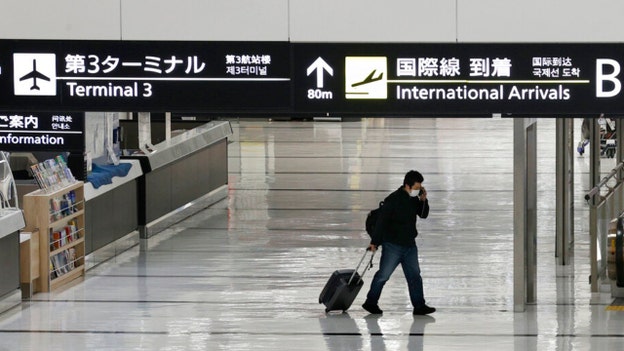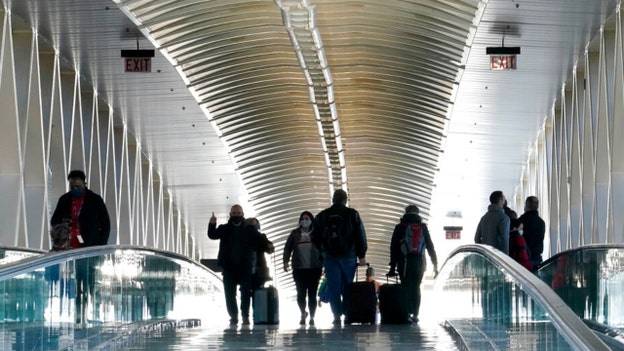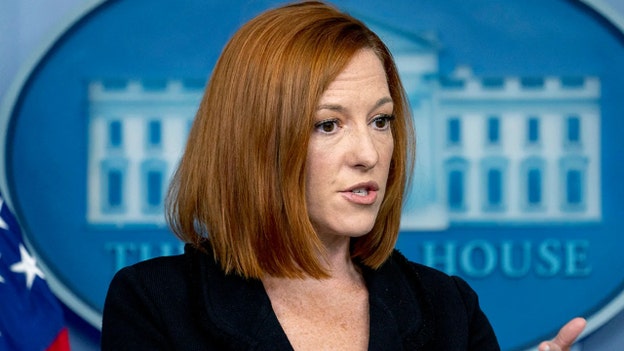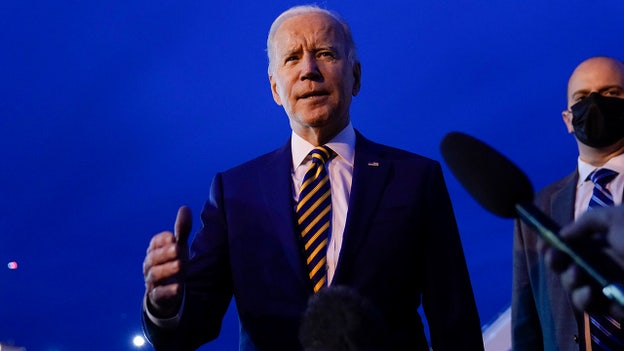Omicron variant: Biden preparing stricter coronavirus testing for all travelers to US: LIVE UPDATES
The Biden administration is preparing stricter testing for all travelers entering the US, including returning Americans, amid the rising threat of the omicron variant
Coverage for this event has ended.
Fox News has confirmed that the U.S. Centers for Disease Control and Prevention (CDC) has identified the first case of the omicron COVID-19 variant in the U.S.
"The California and San Francisco Departments of Public Health have confirmed that a recent case of COVID-19 among an individual in California was caused by the Omicron variant (B.1.1.529)," the CDC wrote in a Wednesday statement.
The agency explained that the individual was a traveler who returned from South Africa on Nov. 22, 2021.
"The individual, who was fully vaccinated and had mild symptoms that are improving, is self-quarantining and has been since testing positive. All close contacts have been contacted and have tested negative," the CDC noted.
Genomic sequencing was conducted at the University of California, San Francisco and the sequence was confirmed at CDC as being consistent with the "variant of concern."
Dr. Anthony Fauci, White House chief medical adviser, told reporters in a news conference that the individual had tested positive on Nov. 29, 2021 and had not received a booster shot.
He said that officials "knew it was just a matter of time before the first case of omicron would be detected in the U.S."
"We know what we need to do to protect people. Get vaccinated, if you're not already vaccinated. Get boosted if you've been vaccinated for more than six months with an mRNA or two months with [Johnson & Johnson] and all the other things we've been talking about..." Fauci said, adding later that there are currently no other cases the CDC is investigating as omicron-linked.
"As the president said last Friday, it was only a matter of time before the first case of omicron was detected in the U.S.," the White House said in a statement later in the day. "We are prepared to meet this challenge with science and speed."
"The president's medical team continues to believe that existing vaccines will provide some level of protection against severe illness from omicron and individuals who have gotten boosters have even stronger protection," they continued. "As such, we urge all adults to get their booster shots and to get themselves and their kids vaccinated, if they haven't already."
The news comes as scientists continue to study the risks posed by the new strain of the virus.
The Biden administration moved late last month to restrict travel from Southern Africa where the variant was first identified and had been widespread. Clusters of cases have also been identified in about two dozen other nations.
The CDC was moving to tighten U.S. testing rules for travelers from overseas, including requiring a test for all travelers within a day of boarding a flight to the U.S. regardless of vaccination status. It was also considering mandating post-arrival testing.
Officials said those measures would only “buy time” for the country to learn more about the new variant and to take appropriate precautions, but that given its transmissibility its arrival in the U.S. was inevitable.
The Associated Press contributed to this report.
The World Health Organization says travel bans by countries are having an impact on global cooperation against the new omicron variant by causing “challenges” to the sharing of laboratory samples from South Africa that can help get better grips on the new variant.
The comments Wednesday came at the first press briefing by the U.N. health agency since it christened omicron as a “variant of concern” after being brought to light by researchers in South Africa last week. Many countries responded by suspending flights from seven southern Africa countries.
WHO Director-General Tedros Adhanom Ghebreyesus called for “tailored” intervention by countries, including testing travelers before and after they arrive in a country, and advised against “blanket travel bans” that “place a heavy burden on lives and livelihoods.”
Maria Van Kerkhove, WHO’s technical lead on COVID-19, said international cooperation was continuing, and that researchers in South Africa have been “very willing to not only share data, not only share information, but also share samples.”
But she said travel bans “have caused some challenges for those samples to actually be shipped out of the country. So, there are other implications for these travel bans that are out there.”
The Associated Press contributed to this report.
Tourism businesses that were just finding their footing after nearly two years of devastation wrought by the COVID-19 pandemic are being rattled again as countries throw up new barriers to travel in an effort to contain the omicron variant.
From shopping districts in Japan and tour guides in the Holy Land to ski resorts in the Alps and airlines the world over, a familiar dread is rising about the renewed restrictions.
Meanwhile, travelers eager to get out there have been thrown back into the old routine of reading up on new requirements and postponing trips.
Abby Moore, a librarian and associate professor at the University of North Carolina, Charlotte, was scheduled to leave for Prague on Wednesday. But the day before her flight, she started having doubts when she saw that Prague had closed its Christmas markets and imposed a citywide curfew.
“I wasn’t really concerned about my trip until the Czech Republic started what looked like a mini-lockdown process,” said Moore, who decided to reschedule her travel to March.
Less than a month after significantly easing restrictions for inbound international travel, the U.S. government has banned most foreign nationals who have recently been in any of eight southern African countries. A similar boomerang was seen in Japan and Israel, both of which tightened restrictions shortly after relaxing them.
While it is not clear where the variant emerged, South African scientists identified it last week, and many places, including the European Union and Canada, have restricted travel from the wider region.For all the alarm, little is known about omicron, including whether it is more contagious, causes more serious illness or can evade vaccines.
Still, governments that were slow to react to the first wave of COVID-19 are eager to avoid past mistakes. The World Health Organization says, however, that travel bans are of limited value and will “place a heavy burden on lives and livelihoods.” Other experts say travel restrictions won’t keep variants out but might give countries more time to get people vaccinated.
London-based airline easyJet said Tuesday that renewed travel restrictions already appear to be hurting winter bookings, although CEO Johan Lundgren said the damage is not yet as severe as during previous waves. The CEO of SAS Scandinavian Airlines said winter demand was looking up, but now we “need to figure out what the new variants may mean.”
“In the past year, each new variant has brought a decline in bookings, but then an increase once the surge dissipates,” said Helane Becker, an analyst with financial services firm Cowen.
Hotels, which were recovering more quickly than expected, have experienced a similar phenomenon.
“Every time there has been a variant, as soon as it clears up a little bit (leisure travel) snaps back very quickly. Business travel is a little more uncertain,” said Ari Klein, a hotels analyst for BMO Capital Markets.
Israel’s decision to close the country to foreign visitors is hitting the nation’s tourism industry as it geared up for the Hanukkah and Christmas holidays. The country only opened to tourists in November, after barring most foreign visitors since early last year.
Just over 30,000 tourists entered Israel in the first half of November, compared to 421,000 in November 2019, according to government figures.
Joel Haber, a Jerusalem-based guide, said during a typical Hanukkah holiday his calendar would be chock full of food tours through Jerusalem’s colorful Mahane Yehuda market. Instead, he has just one tour a day.
“Tour guides like me are the first to get hit and the last to emerge and are directly prevented from working by a government decision,” Haber said.
In the West Bank city of Bethlehem, revered by Christians as Jesus’ birthplace, local businesses expected a boost from Christmas tourism. The Bethlehem Hotel, one of the largest in the city, has operated at a fraction of capacity for the past 18 months.
“Everyone who had bookings over the next two weeks has canceled, while others are waiting to see what happens next,” said the hotel’s manager, Michael Mufdi. “I don’t know how much longer we can last, but we are doing our best.”
The pandemic already caused foreign tourism in Japan to shrink from 32 million visitors in 2019 to 4 million last year, a trend that has continued through this year.
As worries surfaced about omicron, Japan on Wednesday tightened its ban on foreign travelers, asking airlines to stop taking new reservations for all flights arriving in the country until the end of December. The country earlier reversed a relaxation of travel restrictions that had been in effect just three weeks.
The crowds of Chinese shoppers who used to arrive in Tokyo’s glitzy Ginza district in a stream of buses to snap up luxury items have long disappeared. Restaurants and bars have been forced to restrict hours.
In Asakusa, a quaint part of town filled with souvenir shops, rickshaw drivers, and stalls selling traditional sweets, news of the omicron variant made little difference this week. Vendors say there hasn’t been any business for months except for a few local customers.
In South Africa, Frederic Plachesi, owner of Tamboti lodge in Dinokeng Game Reserve, is facing a similar fall-off in the international guests his business relies on.
“The odds are for the next few months, only locals will visit the lodge,” said Plachesi. “We estimate a 60% loss of business because of the omicron restrictions.”
In Europe, Alpine ski resorts worry about how to keep up with requirements such as ensuring all skiers are vaccinated or recovered from infection and have tested negative for the virus.
Matthias Stauch, head of the German ski lift operators association VDS, said many are small family businesses that lack the staff to perform such checks. Meanwhile, the association is warning about “massive” economic damage to the tourism sector if there is another lockdown.
Travel executives argue that government decisions about restrictions should wait until more is known about omicron, but they admit it’s a difficult call.
“If you wait, by the time you have all the data it’s probably too late to stop community spread because (the virus) is already here,” said Robert Jordan, the incoming CEO at Southwest Airlines. “If you jump ahead, you run the risk of the measures being more impactful than the actual cases.”
About a month ago, Javier Barragan and his husband booked a visit to Paris for later this month. When news of omicron hit, they were concerned but decided to go ahead with the trip.
“The way that it was in the news, there’s a sense of ‘Oh, is this worse? Is this different?’” said Barragan, who lives in New York. France’s health protocols — the couple will have to submit vaccine cards to enter the country — made them feel more comfortable. Also, both got booster shots.
They did, however, buy travel insurance that will cover cancellation for most any reason.
The Associated Press contributed to this report.
The World Health Organization (WHO) announced Wednesday that it would "kickstart" a global process to "draft and negotiate a convention, agreement or other international instrument under the Constitution of the World Health Organization to strengthen pandemic prevention, preparedness and response."
In a statement , WHO Director-General Dr. Tedros Adhanom Ghebreyesus said the decision by the World Health Assembly was historic.
“The COVID-19 pandemic has shone a light on the many flaws in the global system to protect people from pandemics: the most vulnerable people going without vaccines; health workers without needed equipment to perform their life-saving work; and ‘me-first’ approaches that stymie the global solidarity needed to deal with a global threat,” Tedros said.
“But at the same time, we have seen inspiring demonstrations of scientific and political collaboration, from the rapid development of vaccines, to today’s commitment by countries to negotiate a global accord that will help to keep future generations safer from the impacts of pandemics," he added.
The Health Assembly reportedly met in its second-ever Special Session since the agency's founding, adopting a decision titled "The World Together.”
The conclusions reached establishes an intergovernmental negotiating body (INB) to draft and negotiate a WHO convention, agreement, or other international instrument on pandemic prevention, preparedness and response, with a view to adoption under Article 19 of the WHO Constitution, or other provisions of the Constitution as may be deemed appropriate by the INB.
Article 19 of the WHO Constitution provides the Health Assembly with the authority to adopt conventions or agreements on any matter within WHO’s competence.
The INB will hold its first meeting by March 1, 2022, and its second by August 1, 2022, and will hold public hearings, deliver a progress report to the 76th World Health Assembly in 2023 and submit its outcome for consideration by the 77th World Health Assembly in 2024.
“The emergence of the highly mutated omicron variant underlines just how perilous and precarious our situation is,” Tedros said on Monday. “Indeed, omicron demonstrates just why the world needs a new accord on pandemics.”
Tedros said the variant of concern's emergence is "another reminder that although many of us might think we are done with COVID-19. It’s not done with us."
The Associated Press contributed to this report.
The U.S. Centers for Disease Control and Prevention (CDC) has reportedly issued a directive requiring airlines to disclose passenger names and other information about people who have recently been in eight southern African countries, according to documents seen by Reuters.
The outlet said that, effective Nov. 8, the CDC instructed all airlines to collect contact tracing information from all international air passengers but had not required them to turn over those names.
The directive also requires that airlines turn over the information within 24 hours of passengers arriving in the U.S. who have been in one of the eight African countries subject to travel restrictions.
Reuters said it took effect late Tuesday night.
The U.S. announced travel restrictions last week, spurred by news of variant B.1.1.529.
Japan asked international airlines on Wednesday to stop taking new reservations for all flights arriving in the country until the end of December.
The move is a a further tightening of already strict border controls implemented in an effort to ward off further transmission of the omicron variant.
The country's transportation ministry said the request is an emergency precaution. It was coupled with Japan's recent return to a ban on foreign visitors that tentatively extends through the end of the year.
Those who have already made reservations are not affected, although flights may be canceled if there are insufficient passengers, the Ministry of Land, Infrastructure, Transport and Tourism said. Transit flights won’t be affected.
Additionally, the decision comes as Japan confirmed a second case of the omicron variant in a person who arrived from Peru, one day after it reported its first case in a Namibian diplomat.
The Associated Press contributed to this report.
In guidance released on international travel in relation to the SARS-CoV-2 omicron variant, the World Health Organization (WHO) wrote Tuesday that people ages 60 or older should delay travel to "areas with community transmission."
In a statement, the agency said that while scientific research regarding the variant of concern is underway to understand its behavior, people who are at increased risk of developing severe disease and dying – including those with comorbidities that present an increased risk of severe COVID-19 "postpone" travel plans to those places.
"Persons who are unwell, or who have not been fully vaccinated or do not have proof of previous SARS-CoV-2 infection and are at increased risk of developing severe disease and dying, including people 60 years of age or older or those with comorbidities that present increased risk of severe COVID-19 (e.g. heart disease, cancer and diabetes) should be advised to postpone travel to areas with community transmission," the WHO wrote.
While not much is known about omicron, the variant has spread to 20 countries, with more than 200 cases reported.
Preliminary evidence raises the possibility that the variant has mutations that could help it both evade an immune-system response and boost its ability to spread from one person to another.
The Associated Press contributed to this report.
The White House on Tuesday responded to concerns voiced by Moderna CEO Stéphane Bancel, who suggested the current vaccines slotted to fight the coronavirus will not be enough to counter the new omicron variant.
"It could go in a couple of different directions," White House press secretary Jen Psaki told reporters, referencing the lethality of omicron.
"It could be less deadly, it could be more. We don’t know yet. "We are not jumping to conclusions because we want to be clear with the American public about what we do and don’t know," she added.
Echoing comments made earlier that day at a press briefing by the White House COVID-19 Response Team, Psaki said the best way to ward off the latest variant is still to get vaccinated.
"Here’s what we do know: getting vaccinated, getting boosted, means that you increase antibodies and you will have additional protection," she told reporters on Air Force One Tuesday.
"If there’s a need for a changing, a tweaking of vaccine, getting that to the market – we will be prepared to do exactly that, but we are not at that point yet," she continued. "We don’t know yet and we’re going to wait for the results and the analysis of health and medical experts."
"The most important thing we can do is get more people vaccinated," Psaki said. "We will continue to encourage other countries to get step up and do more to provide vaccine doses … to the global community."
Fox News' Caitlin McFall contributed to this report.
The Biden administration is set to introduce stricter testing for both vaccinated and unvaccinated legal travelers entering the United States amid the rising threat of the Omicron variant even while illegal migrants have gone mostly untested.
President Biden's enhanced winter COVID-19 strategy that will be announced Thursday will require every traveler entering the country, including returning U.S. citizens, to be tested one day before boarding their flight, according to the CDC. The rule will also apply to vaccinated travelers, who previously were only required to show a negative test no more than three days before their flight.
But the Biden administration has refused to put similar requirements in place for those who illegally cross the border, claiming in September that such individuals do not intend "to stay here for a lengthy period of time."
"As individuals come across the border, and they are both assessed for whether they have any symptoms, if they have symptoms they are," White House press secretary Jen Psaki said at the time.
"The intention is for them to be quarantined," she added. "That is our process, they’re not intending to stay here for a lengthy period of time. I don’t think it’s the same thing. It’s not the same thing."
Click here to read more on Fox News
Live Coverage begins here
